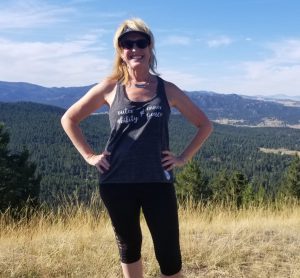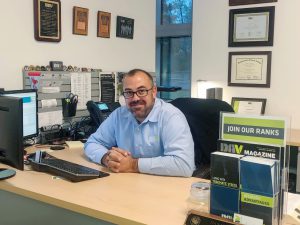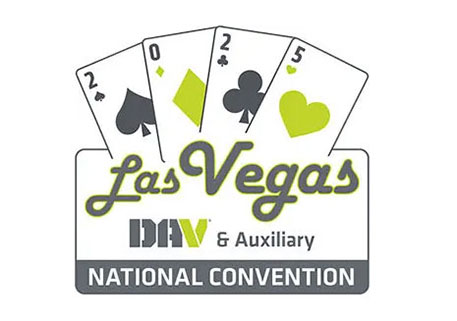
– Jolene Carter, Air Force veteran
DAV offers disaster relief for Air Force veteran whose house was flooded by the Mississippi River
The rough waters of the mighty Mississippi River began to rise gradually at first, this past spring, only reaching Air Force veteran Jolene Carter’s driveway before receding. However, less than two weeks later, her home was flooded with more than 4 feet of standing water due to heavy rains and snowmelt upriver.
“It just came back up with a vengeance really quick,” she said.
As cumbersome, waterlogged furniture floated from room to room, she assessed the extensive damage done to her house. The floods that ripped through her limestone-exterior dwelling, built in 1840, left mud caked throughout the first floor. Her drywall, flooring and wiring had severe damage. She also needed a new HVAC system, doors and windows.
When she bought her Grafton, Ill., home in 2018, Carter was fully aware of its location in a flood plain—an area of low-lying ground that runs the risk of flooding. But she also knew that floodwaters had not reached the property since the Great Flood of 1993, in which large swaths of the Midwest were submerged, causing billions of dollars in destruction.
“Everybody said, ‘Oh that’s a 500-year flood; we’re never going to see that again,’” Carter recalled.
Carter’s house became untenable, forcing her to find someplace else to stay.
“This was the longest-lasting flood we’ve had on record,” she explained. “I had floodwaters in the house for over a month.”
Since residential areas were mostly left untouched, a national disaster was not declared, meaning the Federal Emergency Management Agency could not step in to help. By the end of May, Carter was desperate for relief. That’s when she turned to DAV in nearby St. Louis for help.

“Jolene’s house was pretty much engulfed in water,” said Dan Knabe, assistant supervisor of the St. Louis National Service Office. “It wasn’t at all hard to get her the help she required.”
He explained to Carter that to apply for DAV disaster relief funds, all that was needed was to verify she is a service-connected disabled veteran, the victim of a natural disaster and in immediate financial need. Since DAV had previously represented Carter with her VA claims, verifying her veteran status was no significant hurdle, and photos of her inundated residence were more than qualifying.
“That’s really all that’s required; the process is straightforward,” added Knabe. “That takes a whole lot of stress off of people going through something so drastic at the time in their lives.”
Carter stressed that DAV was the only entity able to provide aid. Either other organizations had burdensome loopholes or other requirements or they offered no assistance at all.
“Props to the DAV because they are so accessible,” said Carter. “They are a super-supportive organization, and I’ve referred so many veterans to the DAV to get assistance.”
Just seven days after she first contacted DAV, relief funds were deposited into her account. Carter said it made a massive difference to her, as she could stay in a hotel and not with family and friends in the area.
“It gave me some hope to get some support and not be a burden on people,” she added.
As a social worker, Carter is no stranger to helping her community. But the flood turned the tables by triggering her post-traumatic stress disorder. “It took me to a really dark place,” said Carter. “Certain things can knock you off your feet, and this flood did that.
“There was a long time in my life that I was ashamed of that label, and I didn’t know that is what I had, but there’s just so much shame in talking about having PTSD, like there was something wrong with me.”
Carter added that the funds allowed her to have some time to herself as well.
“It was a bit of stability in the midst of everything,” she said.
In 2018, 3,569 grants were approved nationwide, totaling more than $1.2 million. In 2017, natural disaster victims in Missouri alone were provided $23,000 due to flooding and tornadoes.
“Having the smooth process to get that assistance to veterans in a quick manner can be a huge step forward for people in desperate need,” said Knabe. “People have to maintain their normal lives with all of this riding on their shoulders, and a little relief can go a long way.”






